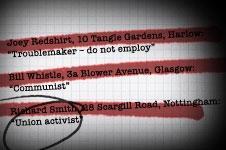Shadow business secretary Chuka Umunna urges blacklisting firms to apologise and set up a compensation fund

The Labour party has urged construction firms involved in the systematic blacklisting of workers to set-up a fund to “immediately begin to compensate” those affected.
Opening an opposition day debate on blacklisting in the House of Commons, shadow business secretary Chuka Umunna also called on firms that were involved in blacklisting through the now defunct organisation the Consulting Association to issue a “fully apology” to workers.
He said: “Not one of the companies mentioned has apologised for its membership and use of the Consulting Association. This is an utter disgrace given all that has come to light. The workers deserve an apology and the companies involved should stop prevaricating and issue an apology now.
“We cannot say with confidence these practices are not still continuing and that is why action is needed.
“This action may take some weeks and months but the time for the denials and putting their heads in the sand by the construction companies involved is over, not least because unless they apologise and accept responsibility the reputation of the entire industry will be tarnished which is not at all fair to those companies in the sector who have not indulged in these practices.”
Umunna added: “I want to finish by asking the construction companies involved to consider setting up a fund into which they could all pay, which could immediately begin to compensate those workers who were blacklisted for the immense loss they have suffered.
“That, in addition, to a full apology would be a good place to start in righting the wrongs which have done to our construction workers.”
The debate came after David Cameron slammed blacklisting as a “completely unacceptable practice” in a heated prime ministers’ questions session, after fielding a question on the issue from Labour MP Ian Levery.
Cameron added: “I think the previous government was right to bring in legislation to make it unlawful. I do welcome the openness and frankness that Labour are using an Opposition Day debate to look at something that went wrong when they were in office.”
Umunna closed his speech in the blacklisting debate by saying: “I want to finish by asking the construction companies involved to consider setting up a fund into which they could all pay, which could immediately begin to compensate those workers who were blacklisted for the immense loss they have suffered.
“That, in addition, to a full apology would be a good place to start in righting the wrongs which have done to our construction workers.”
The issue of blacklisting has risen up the political agenda this week, after Building revealed Balfour Beatty checked workers against the blacklist on the Olympic Park and Sir Robert McAlpine director Cullum McAlpine appeared yesterday at a commons committee hearing on blacklisting.
Durnig the parliamentary deabte, Umunna said alleged police involvement in blacklisting was “particularly serious and shocking” and should form part of a full investigation.
He added that blacklisting was a “national scandal”. “We can’t say these practices have ended which is why action is needed,” he said.
He also criticised the “culture of denial” within construction and firms “simply putting their heads in the sand” on the issue.
Responding to Umunna, business secretary Vince Cable said he had not seen evidence blacklisting is ongoing but said “if there’s evidence forthcoming I will investigate it”.
He said allegations against the police should first be referred to the Police Complaints Commission before the government.
As for the past, he said he would “look carefully to see if any fundamentally new questions are raised” by the Scottish Affairs Committee’s blacklisting inquiry.
He added unions had not raised the issue of blacklisting with him at any point during his first two and a half years in the post.
Former Olympics minister Tessa Jowell welcomed the blacklisting debate and the “opportunity for the House to unite to condemn blacklisting”.
Jowell questioned whether blacklisting became “part of the working culture in construction”, similar to “phone hacking” within tabloid newspapers and noted that Balfour Beatty “thought it was ok and acceptable to carry out blacklisting checks” on the Olympics.

Extracts from Chuka Umunna’s speech on blacklisting:
On construction firms and blacklisting:
“Consulting Association invoices show that between 2006 and 2009, the construction companies involved paid just under half a million pounds for blacklist checks and information. It is inconceivable - given the amounts involved - that these companies’ use and membership of the Association would not have been known about and sanctioned at a senior level. Yet, so far, not one of the companies mentioned has apologised for its membership and use of the Consulting Association. This is an utter disgrace given all that has come to light. The workers deserve an apology and the companies involved should stop prevaricating and issue an apology now.
“We cannot say with confidence these practices are not still continuing and that is why action is needed.
“This action may take some weeks and months but the time for the denials and putting their heads in the sand by the construction companies involved is over, not least because unless they apologise and accept responsibility the reputation of the entire industry will be tarnished which is not at all fair to those companies in the sector who have not indulged in these practices.
“With this in mind, I want to finish by asking the construction companies involved to consider setting up a fund into which they could all pay, which could immediately begin to compensate those workers who were blacklisted for the immense loss they have suffered. That, in addition, to a full apology would be a good place to start in righting the wrongs which have done to our construction workers.”
On blacklisting on public sector contracts:
“Unfortunately in the last few months we have learnt that blacklisting checks were carried out on workers who were to be engaged on publicly funded projects.
“In November last year, Mr Kerr submitted evidence to the Select Committee in which he stated that member companies used Association services for checking potential employees applying to work on major public sector contracts. He said these ranged from airport runways, buildings such as Portcullis House, the Ministry of Defence in Whitehall, GCHQ, the Jubilee Line, the Millennium Dome, PFI Projects, hospitals, schools, Olympics sites, to road and rail contracts and so on.
“This is corroborated by the admission last month by Balfour Beatty in a letter to the Olympic Delivery Authority. Without the knowledge of the ODA, Balfour Beatty admitted it had used the services of the Association in 2008 to check on 12 prospective Olympics workers - thankfully they nevertheless went on to be employed.
“It was also corroborated yesterday by Cullum McAlpine - he is a director of Sir Robert McAlpine Ltd and was chair of the Association from 1993 to 1996. He confirmed to the Select Committee that the Consulting Association’s services were used on a large number of public projects, including the Olympics and the Jubilee Line.
“But, given what I have just set out and what we now know, I do believe there is sufficient evidence to justify Government carrying out a full investigation into the extent blacklisting took place - and may still be taking place – at the very least on public sector projects.
“After carrying out the investigation, Government should then set out what practical steps may be needed stop blacklisting and blacklisting checks happening on public projects in the future. No doubt, in so doing, the Government will want to consider whatever findings the Scottish Affairs Select Committee makes when it reports.”


























2 Readers' comments